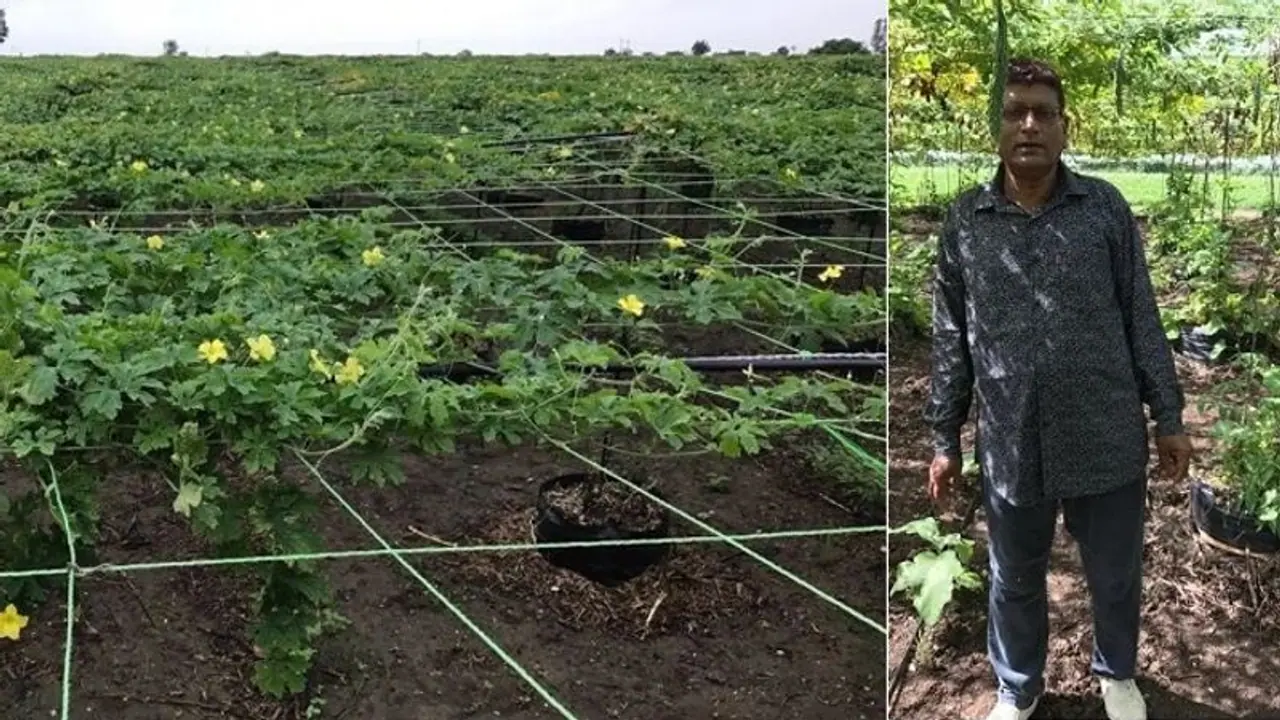Ashwin Nariya has been engaged with organic farming for the past 20 years. He educates other farmers about his farming methods that involves the use of cow urine, cow dung, cow milk, and turmeric in the fields. This approach has proved beneficial as many farmers have been able to increase their production at reduced costs.
Surat: Ashwin Nariya is an agriculture graduate from Gujarat. In the year 2002, he learned about the harmful effects of the use of chemicals in agricultural practices. During the same time, he embarked on his journey to explore organic farming methods and developed a model called ‘Panch Sanskar’ for a more sustainable approach to farming. He highlights that chemicals in vegetable cultivation can pose serious risk to our lives. He has designed a method which includes a technique called ‘AC Mandap’ for cultivating chemical-free vegetables.
What is AC Mandap?
Ashwin Nariya made the AC Mandap (5-layer farming arrangement) using plastic pipes that he installed in his fields with wires at a height of 25 feet. The whole arrangement has been done to accommodate various kinds of crops. There are five layers in this method ensuring proper sunlight access to all vegetables. In the upper layer, vine vegetables are planted as they require climbing space. Tomatoes and similar vegetables are planted in the middle layer as they require partial sunlight. Then pumpkins, cucumbers, and other similar vegetables are planted on the ground layer, and the other vegetables like potatoes and turmeric are planted in the inter block area.
A dedicated farmer
Ashwin Nariya has considered various other factors like global warming that affects the growth of plants. He has implemented measures in his fields to regulate temperature and humidity to maintain a good environment for vegetable growth. Ashwin calls the whole arrangement as AC Mandap as he has included machineries that control the temperature to ensure optimal growth conditions.
Ashwin Nariya has been engaged with organic farming for the past 20 years. He educates other farmers about the use of cow urine, cow dung, cow milk, and turmeric in the fields in the form of organic fertilizers. This approach has proved beneficial as many farmers have been able to increase their production at reduced costs.
What is Panch Sanskar method?
Furthermore, he mentions that his Panch Sanskar methods allow him to study his soil that yields better crop production. He emphasizes that the natural elements like the land (bhoomi), seeds (beej), water, air, and vegetation are integral to enhance the production.
Bhoomi Sanskar
In Bhoomi (Land) Sanskar, Ashwin prepares the land for his farming activities. This method involves the plantation of large tress such as Neem, Jamun, and Mango to regulate temperature and provide shade. For soil’s fertility, he adds 10 litres of castor oil and 50 litres of cow urine to each acre. He also adds tuber ash to the fields which he believes contributes to the increased oxygen levels in the soil.
Beej Sanskar
In Beej (Seeds) Sanskar method, a mixture is prepared with cow dung, milk, cow urine, lime, turmeric, and cow milk. The seeds are then soaked in this mixture for 24 hours before being sown into the soil. Ashwin believes that this method enhances the quality of the seeds.
Jal Sanskar
In Jal (Water) Sanskar method, water is mixed with cow dung ash and Kush grass. This practice enhances the water’s quality with beneficial properties, promoting healthier crop growth.
Vanaspati Sanskar
In Vanaspati (Vegetation) Sanskar, natural methods are used to keep the pests at bay. A mixture is prepared using cow urine and jaggery which is then sprayed on the crops to maintain plant’s health and remove the pests. These natural pesticides help in preserving the health and productivity of the crops.
Vayu Sanskar
The Vayu (Air) Sanskar methods involves religious Havan practices. The fire is kindled using cow dung cakes, pure ghee, and nine types of woods of plants mentioned in the religious scriptures. It is believed that the fire created with these materials produces 108 types of gases, which helps eliminate harmful bacteria from the environment.
Educating other farmers
Ashwin Nariya shares that he spent the last eight months in Portugal and African countries, where he introduced the Panch Mandap (5-layer farming arrangement) method to farmers. He conducted several sessions on organic farming practices. He mentions that Indians living abroad find it difficult to buy Indian vegetables. His methods have provided them with a solution to grow these vegetables in foreign lands.
